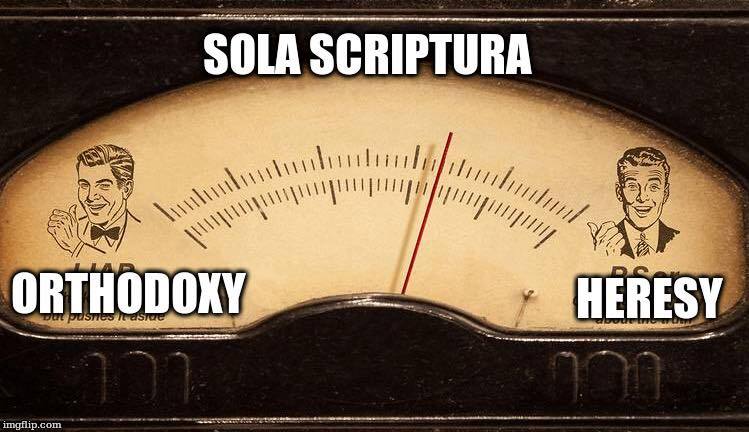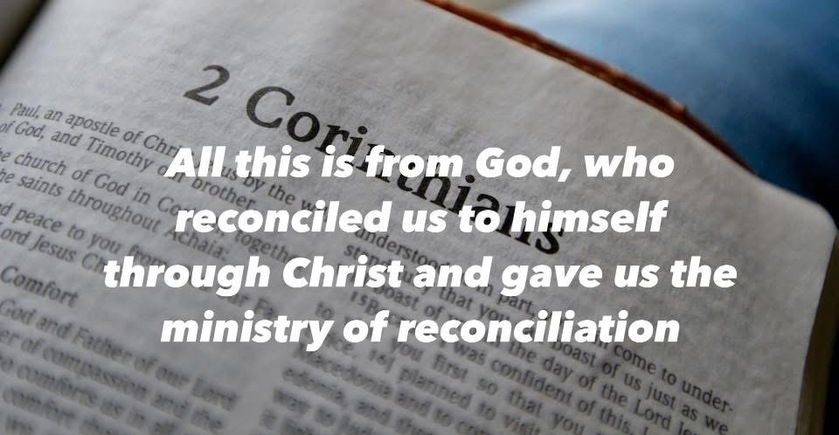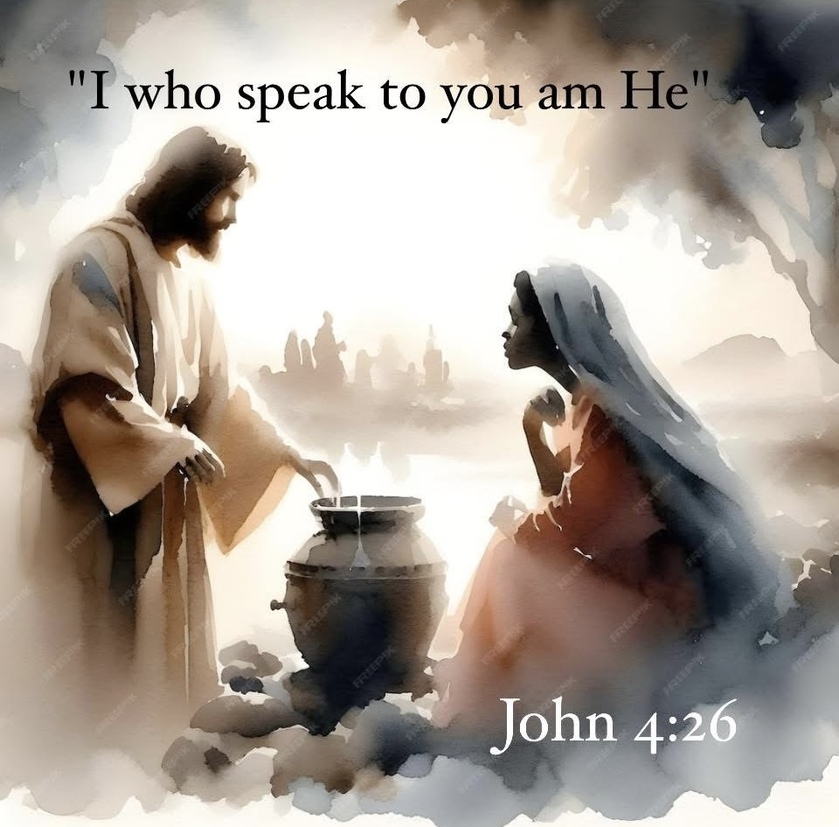Sola Scriptura and Witness: Proclaiming the Risen Christ’s Forgiveness in Truth
Acts 10:36-43
"As for the word that he sent to Israel, preaching good news of peace through Jesus Christ (he is Lord of all), you yourselves know what happened throughout all Judea, beginning from Galilee after the baptism that John proclaimed: how God anointed Jesus of Nazareth with the Holy Spirit and with power. He went about doing good and healing all who were oppressed by the devil, for God was with him. And we are witnesses of all that he did both in the country of the Jews and in Jerusalem. They put him to death by hanging him on a tree, but God raised him on the third day and made him to appear, not to all the people but to us who had been chosen by God as witnesses, who ate and drank with him after he rose from the dead. And he commanded us to preach to the people and to testify that he is the one appointed by God to be judge of the living and the dead. To him all the prophets bear witness that everyone who believes in him receives forgiveness of sins through his name."
Jesus was judged by men, judged and found innocent of the crimes he was convicted for. Convicted and crucified. They executed an innocent man (Luke 23:4, 14). In hanging Him "on a tree" (a reference to the cross, drawing from Deuteronomy 21:23), humanity’s sin was exposed, and in doing so they judged themselves. This act of injustice became the means by which God laid the sins of the world upon Him, turning human condemnation into divine salvation. And Peter declares, that through him, all the prophets bear witness. He's leaning on the witness of the scriptures as well as his own eyewitness. He's drawing attention to the Old Testament scriptures, which he sees fulfilled in Jesus. Making biblical application of what he understands about the things he's seen while living and working with Jesus. This dual witness makes his message compelling and rooted in both lived experience and divine revelation. And yet today, that sort of personal interpretation of the Scriptures would be called into question.
Peter’s approach here shows a deep understanding of how Jesus’ life and work fulfill the scriptures. As an apostle who walked with Jesus, ate with Him after the resurrection, and saw the empty tomb, Peter’s firsthand account carries weight. But at the end of the day, it's still only his own personal interpretation of what he saw and experienced.
So, here we have the preaching of the gospel truth. He’s summarizing the life, death, and resurrection of Jesus as the fulfillment of God’s plan for all people, not just the Jews. And by tying it to "all the prophets," he’s showing that Jesus isn’t a standalone figure; He’s the culmination of centuries of God’s work and promises. By weaving his eyewitness experience with scriptural prophecy, I believe Peter makes a biblical application that’s both personal and universal. A worthy model for sermon writing that's grounded on the authority of Scripture. He’s saying, "I saw this, and the scriptures confirm it—Jesus is the Messiah for all who believe." This approach bridges his lived reality with the timeless truth of God’s word.
So, just what exactly is Peter summarizing in his short sermon?
The simple answer is the resurrection. There's a lot packed into his testimony, but largely it's about the resurrection. Peter is summarizing the core of the gospel; the life, ministry, death, resurrection, and divine purpose of Jesus Christ, presented as the fulfillment of God’s redemptive plan for all people. It's a sample for you and for me. It's a model for fulfilling the Lord’s command to preach the gospel. This is the message that Jesus wants to go out. It's his viral message for all the world. It's to this message that Peter points our attention, not to himself, or "The Church", but to this gospel message about Jesus Christ as he preaches to Cornelius and his family and friends.
Peter distills the essence of the gospel into a compact message tailored for Cornelius and his Gentile household, yet universal in its scope. Peter opens with the "good news of peace through Jesus Christ," declaring Him "Lord of all." This establishes Jesus as the divine Savior who reconciles humanity to God, a message especially striking for Gentiles like Cornelius, who were outsiders to Israel’s covenant. He goes on to recount Jesus’ life, starting from His baptism in Galilee, where God anointed Him with the Holy Spirit and power. He shared that Jesus went about "doing good and healing all who were oppressed by the devil," showing God’s presence in His works. This highlights Jesus’ identity as the Messiah and His compassionate mission. Peter briefly notes the crucifixion, and implies Jesus bore the curse of all sin, setting the stage for the redemptive significance of His death. And he emphasizes the resurrection. This is Peter’s eyewitness testimony, confirming Jesus’ triumph over death and validating Jesus' identity as the Messiah. The resurrection is the turning point, transforming the cross from defeat to victory. And then he turns the story around and begins to explain how all these things happened in order to underscore His divine authority and the universal scope of His mission. By these things He is made the judge of all humanity, "appointed by God to be judge of the living and the dead." And he finished with the stamp of Old Testament scripture approval. He ties it all to scripture, Prophecies like Isaiah 53 (the Suffering Servant) or Psalm 16:10 (the Holy One not seeing decay) pointing to Jesus’ redemptive work, making forgiveness accessible to all through faith in Him.
Many today may not like it, but Peter was among the first of the Sola Scriptura scholars.
"Sola Scriptura" (Latin for "Scripture alone" ) is a doctrine formalized during the Protestant Reformation, emphasizing that the Bible is the sole infallible rule of faith and practice for Christians, above church traditions, councils, or personal revelations. Though my statement is anachronistic, it's true just the same, Peter leaned on scripture for authority when witnessing to what he knows about Jesus Christ.
You know who else did likewise?
Jesus.
Both Peter and Jesus consistently appealed to the authority of Scripture (the Old Testament in their context) to authenticate their messages about God’s redemptive plan. Jesus Himself frequently leaned on Scripture as the bedrock of truth, often using it to teach, defend, and fulfill His mission. This shared reliance on "It is written" or prophetic fulfillment underscores a profound reverence for God’s written word as authoritative. Jesus treated scripture as the ultimate standard for faith, practice, and revelation, often prioritizing it over human traditions or interpretations. And even as this emerging "Church" community was just getting started, there began to be a need for exhortation to correct errors and outright heretical beliefs. This reverence for "It is written" set a pattern for the early Christian community. Even as the Church was emerging; house churches forming, apostles preaching, and the gospel spreading, false teachings crept in, prompting corrective responses rooted in Scripture, and backed up by apostolic authority.
The New Testament (new Scriptures) itself records the apostles addressing nascent errors, often using Old Testament Scripture as a key tool to refute them, while also invoking their eyewitness authority and Jesus’ teachings. For instance, Paul wrote to the Galatian churches to correct those insisting on circumcision and Mosaic Law observance for salvation; a form of traditional legalism that undermined grace. He appealed directly to Scripture, quoting Genesis 15:6 and Habakkuk 2:4 to argue that "the righteous shall live by faith" (Galatians 3:11), and used Abraham as a prophetic type fulfilled in Christ (Galatians 3:6-9, 16). This wasn’t just exhortation; it was a scriptural defense against a heresy that could fracture the young Church. And so, we can see again this pattern of Sola Scriptura, Paul tests teachings against Scripture alone, without deferring to a council or a agreed upon tradition.
The fact of the matter is, even the Old Testament scriptures teach Sola Scriptura. Just read through the OT prophets and you won't be able to avoid it. Throughout the entire history of the faith the traditions of men has been a source of controversy and downright heresy. The prophets frequently called Israel back to the written covenant and commandments given through Moses (the Torah in Exodus, Leviticus, Deuteronomy), critiquing human innovations or corrupt traditions that deviated from God’s revealed word. While not a prophetic book per se, Deuteronomy sets the stage for prophetic ministry by warning against adding to or subtracting from God’s commands (Deuteronomy 4:2; 12:32). And of course, the people broke from these commands over and over again. And every time it was for the same reasons. They would mingle pagan cultural norms with their faith. Sometimes due to a pagan wife, and other times due to hanging around with the wrong people. And of course, pagan influences would come in during times of exile and captivity. And so, through all these centuries of human history and pagan influences, practices would be adopted which eventually became "tradition".
Israel’s repeated deviations often stemmed from these same patterns of disobedience to God's authority found in his written word. Intermarriage with pagans, adopting Canaanite practices, Babylonian syncretism. This cycle of apostasy and reform underscores how the "traditions of men," when detached from or contradicting God’s revealed word, became sources of controversy and heresy, much like Jesus later critiqued in Mark 7:8-13.
The Catholic (and Orthodox) perspective would suggest that the OT integrates Scripture with oral tradition and communal authority. And this would, in their mindset, suggest that the traditions of men are integral to the creation of Scripture. But what they miss is that the prophets were arguing and exhorting that it was exactly those human industries that were responsible for the disobedience. The prophets leaned hard on avoiding the temptation to bastardize their faith with human invention and tradition. They consistently warned of the dangers of "traditions" influence.
The simple fact of the matter is, pagan-influenced customs led to covenant-breaking every time. This wasn’t just occasional advice that the prophets gave; it was a core theme of prophetic ministry, rooted in the Torah’s commands to remain separate and holy. The prophets saw these pagan influences as direct paths to idolatry, disobedience, and divine judgment, often tracing Israel’s downfall to such syncretism.
This prophetic emphasis fuels debates on "traditions" even today, with stakeholders interpreting the warnings differently. But the fact remains that the best practice is to avoid these human inventions (Magisterium) and traditions and remain closely tied to Scripture in order to fend off any temptations to stray from the truth.
Post-apostolic developments that contradict the sufficiency of Scripture are dangerous and reek of the broken human nature that has always engaged in these things. We see this throughout all the Scripture, and we should heed that historical precedent. Such additions to our faith risk repeating the OT prophets’ warnings against the corrupting influence of human traditions.
The historical precedent in Scripture is a call to heed Sola Scriptura, prioritizing God’s Word to guard against straying from truth. Witness and Scripture, that's the model. They must be in tandem always. We see this in today's devotional scripture focus. We see Peter and his sermon as the example. And we continue to see this theme time after time as we go on in the book of Acts. This pattern of grounding testimony in God’s Word to guard against error and convey the redemptive plan continues throughout the book of Acts, reinforcing the principle that Scripture, paired with faithful witness, keeps believers anchored in truth.
It's simple friends, just look around at your faith practices. What's the focus? Is it inward or heavenly? Are you promoting the witness of the Church or the witness of the Word of God? Are you praying to our Lord and God Jesus Christ, or some "thing" else.
Prayer:
Heavenly Father, thank You for the powerful witness of Your Word through the prophets and apostles like Peter. Help us to cling to Scripture’s truth, guarding our hearts against human inventions, and empower us to boldly share the good news of peace and forgiveness through Jesus Christ, the risen Lord of all. May our lives testify to His redemptive grace.
In Jesus’ Holy name, Amen.




















